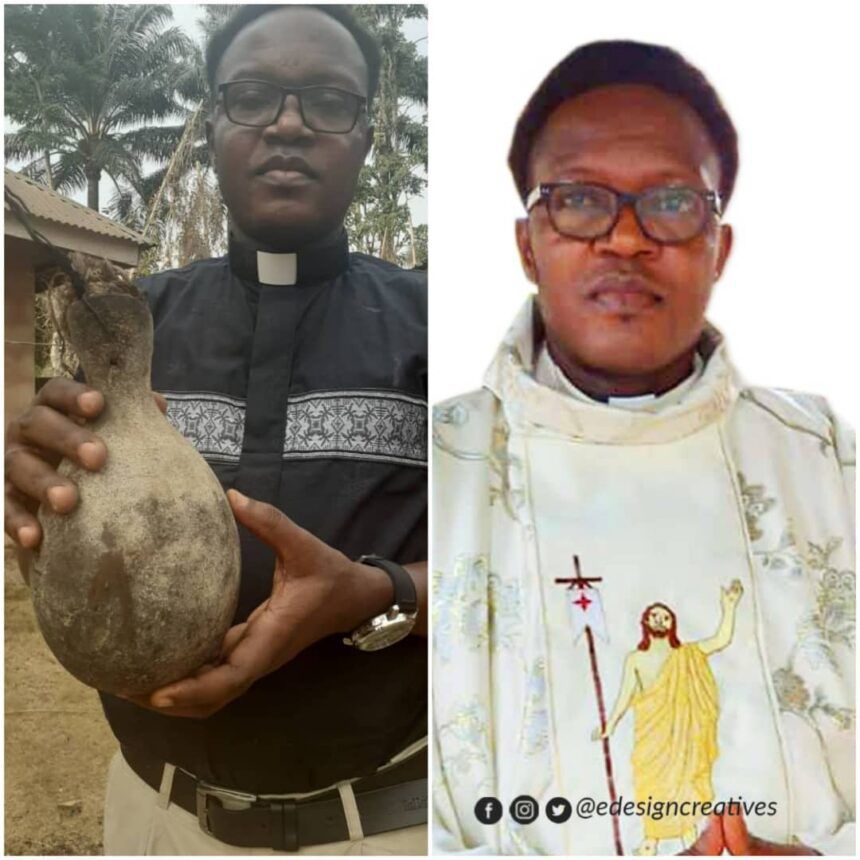A Catholic Priest, Dr. Echezona Augustine Obiagbaosogu, who served for 17 years, has caused a stir within both his local congregation and the broader Catholic Church following his resignation to take up a new vocation as a native doctor specializing in rain-making. His departure from the priesthood marks a dramatic shift in his personal and spiritual journey, one that sees him embrace a deep connection to African Traditional Religion (ATR).
Obiagbaosogu, who also teaches African Traditional Religion at Nnamdi Azikiwe University in Awka, Anambra State, explained his decision in a public statement, revealing his growing interest in traditional African spiritual practices, which led him to pursue the ancient art of rain-making. For several months, he studied under a well-known native doctor, learning the spiritual and ritualistic practices that form the foundation of this ancestral craft.

“I have come to realise that my true calling is to serve my people through the ancient traditions of our ancestors,” Dr. Obiagbaosogu said. “I am not turning my back on God, but rather, I am embracing the divine in a more meaningful and authentic way.” His words suggest a shift in his spiritual beliefs, a move away from the structured framework of Catholicism towards a more fluid and culturally rooted spiritual practice.
At the core of Obiagbaosogu’s reasoning is the belief that the boundaries between religion, science, and magic are more interconnected than commonly perceived. “Civilizations began with magic, moved to religion, and today we are talking about nanoscience and other fields,” he said in a statement. “The white man was able to explore these magical laws, codify them, and call them science. So, science is essentially what was once magic.”
The former priest further elaborated on what he terms “African science,” describing it as a field that has yet to be fully explored and understood. “We can also access these magical laws, which we call African magic or religion. It is not the African magic of Nollywood. The African magic of Nollywood is one of the tools used to destroy our culture and values,” he asserted. “African magic is actually African science, which remains unexplored. We must begin to modify, codify, and document it for posterity.”
His remarks reflect a growing movement in some intellectual and spiritual circles in Africa, where scholars and practitioners are advocating for the preservation and revitalisation of indigenous knowledge systems. For Obiagbaosogu, this return to African traditions represents not just a spiritual journey but an intellectual one as well, a reclaiming of cultural practices that have been marginalized or misunderstood.
When asked about his decision to leave the priesthood, Obiagbaosogu was circumspect. “Life is a process. Things happen, and people begin to look left and right,” he remarked. “One important thing is for the person to know themselves. If you understand yourself and remain open to reality, you will begin to make decisions for your life.” He declined to go into detail about the personal nature of his resignation but made it clear that it was a matter of deep conviction and personal growth.
Dr. Obiagbaosogu’s departure from the Catholic Church has sparked mixed reactions. Some express support for his decision to explore a spiritual path that is closely tied to his roots, while others view it as a betrayal of his religious vows. Regardless of public opinion, Obiagbaosogu appears resolute in his new calling, which he believes will allow him to better serve his community and honour the spiritual traditions of his ancestors.